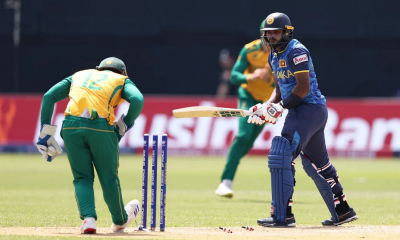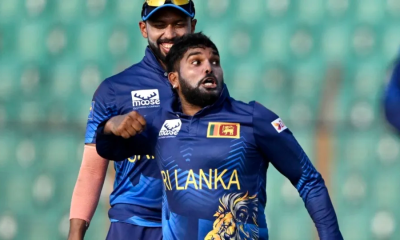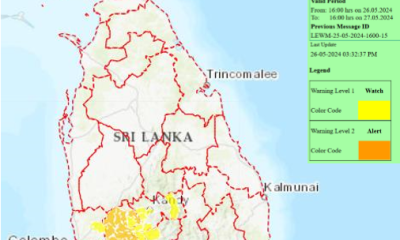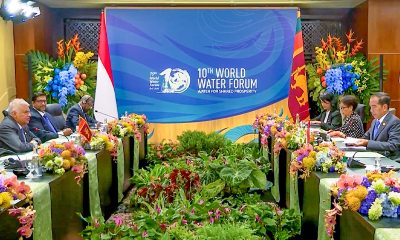News
Phony claims swirl around Lanka’s holiest tree
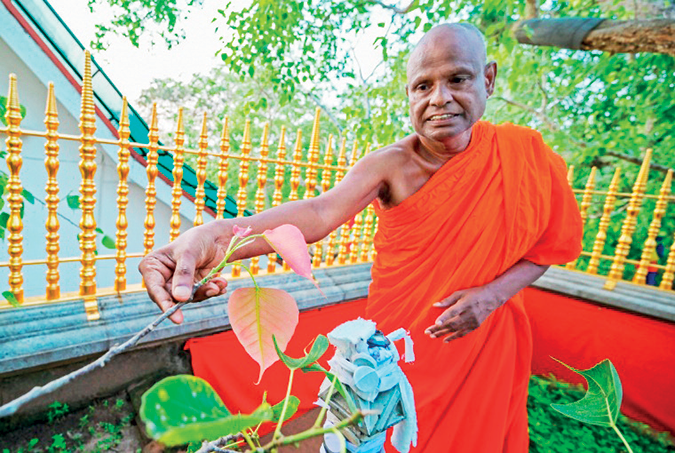
By Amal Jayasinghe
When social media was inundated with rumours that Sri Lanka’s holiest tree was being harmed by 5G mobile signals, Colombo’s cash-strapped government pulled out all the stops.President Ranil Wickremesinghe dispatched a high-powered team of experts to the 2,300-year-old Sri Maha Bodhi tree in the sacred city of Anuradhapura, an ancient capital of the South Asian nation.
It included the head of the telecom regulator, his technical chief and the director of the National Botanical Gardens, along with university professors and district administrators.Several visits were made, surveys were carried out, and the centuries-old tree was examined and monitored before a conclusion was reached: there were no 5G signals in the area in the first place.
The episode highlighted the speed with which fake news travels in Sri Lanka — but even more so, it illustrated the reverence in which the country holds the Sri Maha Bodhi.
The tree is believed to have been grown from a cutting of the bodhi tree in India that sheltered the Buddha when he attained enlightenment more than 2,500 years ago.It is both an object of worship and a symbol of national sovereignty on the majority Buddhist island of 22 million people.
The first claims it was under threat appeared on a local website: 5G radiation from towers near the tree was supposedly turning its leaves black, and it was at “great risk” of eventually shedding them all and dying.
Memes were shared widely on Facebook and WhatsApp groups, and a television presenter repeated the theories on his YouTube channel.The chief monk of the Bomaluwa Temple that houses the tree in Anuradhapura, 200 kilometres (125 miles) north of Colombo, was accused of taking bribes from phone operators to let them set up 5G base stations nearby.
“I am not a scientist, nor a botanist, so I raised the issue with the president in February,” monk Pallegama Hemarathana, 68, told AFP. “He immediately appointed a panel of experts.”
“The government and the Buddhists will do whatever it takes to protect the Sri Maha Bodhi.”
There are four older base stations within 500 metres of the tree, but Telecommunications Regulatory Commission Director General Helasiri Ranatunga told AFP there was “no 5G coverage in the sacred area as rumoured”.
Radiation in the area was well below World Health Organization thresholds, he said, and botanical experts had ruled there was no threat from existing 2G, 3G or 4G coverage.
The panel did, however, recommend banning mobile phone use to preserve the temple’s tranquility, he added.While there are already signs in place to that effect, they are widely ignored by the hordes of visitors who come to the site.At the moment, fresh heart-shaped, purple-green leaves are sprouting on the tree.
Botanically a “ficus religiosa” — also known as a “bo” — the tree is worshipped by thousands of Buddhists daily as a symbol of the “living Buddha”.
Comparatively small despite its long history, it is propped up by 10 gold-plated iron supports and dwarfed by another bodhi a short distance away.
First-time visitor G. Kusumalatha travelled 400 kilometres from Walasmulla with more than 60 other pilgrims to pay homage to the sacred tree.
“I feel ecstatic to be so close to the Sri Maha Bodhi,” she said, thanking the “good karma” that had given her the opportunity.
But no one is allowed within an arm’s length.The original tree in India is said to have died centuries ago.Its Sri Lankan descendant was the scene of a terror attack in March 1985 by separatist Tamil Tiger rebels that left more than 120 people dead.
Since then, the tree has been provided with airport-style security, with visitors going through metal detectors and pat-downs.It is surrounded by two gold-plated fences and protected round the clock by monks, police and armed troops.
Several men are also deployed to clap their hands and chase away squirrels, birds and monkeys that could threaten the tree.Sashika Neranjan, 39, was visiting on a recent day with his extended family.
“Our sister and brother managed to get permanent residency in Australia after taking a vow here,” he said.
“We are here to thank the sacred bo tree.”
News
US sports envoys to Lanka to champion youth development

The U.S. Embassy in Colombo welcomed the U.S. Sports Envoys to Sri Lanka, former National Basketball Association (NBA) and Women’s National Basketball Association (WNBA) players Stephen Howard and Astou Ndiaye, from June 8 through 14.
The Public Diplomacy section of the U.S. Embassy said that it would launch a weeklong basketball program intended to harness the unifying power of sports, made possible through collaboration with Foundation of Goodness and IImpact Hoop Lab.
While in Sri Lanka, Howard and Ndiaye, both retired professional basketball players, will conduct a weeklong program, Hoops for Hope: Bridging Borders through Basketball. The Sports Envoys will lead basketball clinics and exhibition matches and engage in leadership sessions in Colombo and Southern Province for youth aged 14-18 from Northern, Uva, Eastern and Western Provinces, offering skills and leadership training both on and off the court. The U.S. Envoys will also share their expertise with the Sri Lanka Basketball Federation, national coaches, and players, furthering the development of basketball in the country. Beyond the clinics, they will collaborate with Sri Lankan schoolchildren to take part in a community service project in the Colombo area.
“We are so proud to welcome Stephen and Astou as our Sports Envoys to Sri Lanka, to build on the strong people-to-people connections between the United States and Sri Lanka,” said U.S. Ambassador Julie Chung. “The lessons that will be shared by our Sports Envoys – communication, teamwork, resilience, inclusion, and conflict resolution – are essential for leadership development, community building, equality, and peace. The U.S. Sports Envoy program is a testament to our belief that sports can be a powerful tool in promoting peace and unity.”
News
Rahuman questions sudden cancellation of leave of CEB employees

SJB Colombo District MP Mujibur Rahuman in parliament demanded to know from the government the reasons for CEB suspending the leave of all its employees until further notice from Thursday.
MP Rahuman said that the CEB has got an acting General Manager anew and the latter yesterday morning issued a circular suspending leave of all CEB employees with immediate effect until further notice.
“We demand that Minister Kanchana Wijesekera should explain this to the House. This circular was issued while this debate on the new Electricity Amendment Bill was pending. There are many who oppose this Bill. The Minister must tell parliament the reason for the urge to cancel the leave of CEB employees,” the MP said.However, Speaker Mahinda Yapa Abeywardena prevented Minister Wijesekera responding to the query and said that the matter raised by MP Rahuman was not relevant.
News
CIPM successfully concludes 8th Annual Symposium

The Chartered Institute of Personnel Management (CIPM) successfully concluded the 8th Annual CIPM Symposium, which took place on 31st May 2024. Themed “Nurturing the Human Element—Redefining HRM in a Rapidly Changing World,” the symposium underscored the pivotal role of human resource management (HRM) in today’s dynamic global landscape. Since its inception in 1959, CIPM has been dedicated to advancing the HR profession through education, professional development, and advocacy, solidifying its position as Sri Lanka’s leading professional body for HRM.
Ken Vijayakumar, the President of the CIPM, graced the occasion as the chief guest. The symposium commenced with the welcome address by the Chairperson, Prof. Arosha Adikaram, followed by the Web Launch of the Symposium Proceedings and Abstract Book by the CIPM President. The event featured distinguished addresses, including a speech by Chief Guest Ken Vijayakumar, President of CIPM, and an address by Guest of Honor Shakthi Ranatunga, Chief Operating Officer of MAS Holdings Pvt. Ltd., Sri Lanka.
The symposium also featured an inspiring keynote address by Prof. Mario Fernando, Professor of Management and Director of the Centre for Cross Cultural Management (CCCM) at the University of Wollongong, Australia.
Vote of Thanks of the inauguration session was delivered by Dr. Dillanjani Weeratunga, Symposium Co-chair.
The symposium served as a comprehensive platform for researchers to present their findings across a wide range of critical topics in HRM. These included Cultural Diversity and Inclusion, Talent Development and Retention, Ethical Leadership and Corporate Social Responsibility, Adapting to Technological Advancements, Mental Health and Well-being at Work, Global Workforce Challenges, Employee Empowerment, and Reskilling and Upskilling.
The plenary session was led by Prof. Wasantha Rajapakse. Certificates were awarded to the best paper presenters during the valedictory session, followed by a vote of thanks delivered by Kamani Perera, Manager of Research and Development.
The annual symposium of CIPM was a truly inclusive event, attracting a diverse audience that spanned undergraduates, graduates, working professionals, research scholars and lecturers. This widespread interest highlights the symposium’s significance in the field of HRM, offering a unique opportunity for everyone to network and learn from scholarly brains.The CIPM International Research Symposium was sponsored by Hambantota International Port, Sri Lanka Institute of Information Technology (SLIIT), E B Creasy & Co. PLC, and Print Xcel Company.




